
|
The Great
Land Rush |
|
Also
see the "Big Flood of April 22, 1885;" the
"Run of 1889" |
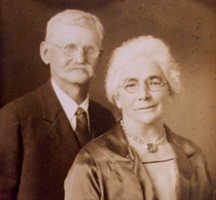 |
Luther and Nellie Jones |
[Note -- the author and her husband Martin Luther Jones are seen here.]
I was still living in western Kansas when Oklahoma was opened up for settlement. One day my father said I am going to Oklahoma and take a claim. I said I am going along and take a claim. Father said, "Who is going to teach your school this fall?" I said, "Someone else can teach it."
Father seemed to think a girl would not stand a chance in the race for a claim. We started for the Oklahoma line a few days before the opening date. We had some thrilling experiences before we arrived.
In order to get a drink of water it was necessary to drink out of holes along the trail. The Cimmaron River was high. We got stuck in the quicksand and the men had to get out in the river and push. We had to hitch another team on to pull the wagon across the river. The water came up in the wagon bed. When we arrived in the Indian Reservation, the cowboys told us the Indians were on the war path.
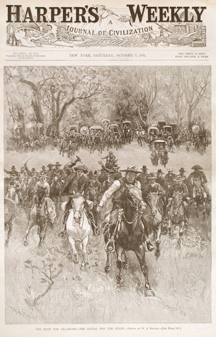 |
|
Harper's Weekly coverage of the Rush |
[Seen here: front page sketch in Harper's Weekly with the caption reading "The rush for Oklahoma--The Signal for the Start" -- drawn by W.A. Rogers.]
At night we put eight wagons in a circle and stood guard all night but no Indians appeared. The next night a rattlesnake was killed just before we went to bed on the ground. It was necessary to leave one of the wagons behind that had broken down and load the things on the other wagon.
We arrived on the west line the night before the long ago remembered day of April 22, 1889. There were thousands of men and women and children who had come to seek their fortune in the sands of Oklahoma.
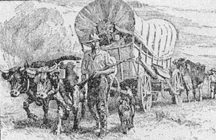 |
|
Oklahoma pioneer settlers |
It was impossible to sleep during the night as there was a lot of excitement. Children cried. Dogs barked. Men quarreled, fought and played cards all night. About 11 o'clock everyone began to get in line for the big race. Some were on horseback, some in buggies and carts and wagons. One man drove a horse and cow. Father and my brother were on horses. My sister and I drove an old mule hitched to a buggy.
At 12 o'clock the soldiers fired the gun and the race was on. I drove the old mule over the line and jumped out and staked my claim but five men stuck their stakes near mine. Sister and I put up our tent.
That evening father and brother came back discouraged as someone else was always ahead of them but the next day they were lucky and each filed on a claim. Brother's claim was next to the famous Dalton Boys' farm. He proved up they always treated him line a real gentleman. He built a sod house by digging a hole in the ground then putting lumber across the top of the hole and covering it with sod. As there were no trees for fire weed, we picked up buffalo chips. We piled them up to dry. Didn't smell too good when they were burning but it beat freezing in the cold weather.
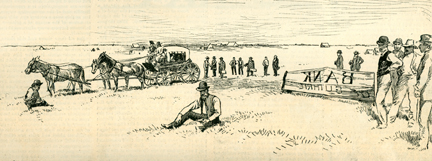 |
| Businessmen mark the site of a future bank on the first day of the Run of '89 |
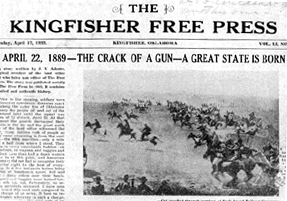 |
Retrospective article in the Free Press |
My sister and I had quite an experience. There was one night brother was gone and we were alone. An Indian came in and wanted something to eat and said he was going to eat and snooze. We fed him and he laid his blanket on the floor and went to sleep. Sister and I set up all night. One of us had the axe and the other one had a butcher knife. It was a good thing he never made a false move all night and it was a good thing for him he didn't. He sure would have been a dead Indian if he had made a false move.
Back to my experience filing a claim. When the land office opened at Kingfisher I was there to get filing papers. I thought I had arrived early but there was a line of men already standing in line, ready to file.
After standing in line all day I was given a number. My number was 640. The man said, "If you lose your number you will lose your place." The next morning I was at the land office early. The men that had staked my claim thought they would wait till the rush was over but they waited too long.
I lived on my claim a year and a half and paid one dollar and a quarter an acre and the claim was mine. It was located half a mile west of Kingfisher on the north side of the road. After I had been there a year and a half I took the chills so head to leave. I went to Kansas to visit another sister, Ella Young. There I met a young farmer named Martin Luther Jones and we were later married and I spent the rest of my life in Kansas.
|
Republished 2000 by Mark A. Miner. Land rush sketches republished from Harper's Weekly, May 18, 1889 (bank site) and Oct. 3, 1891 (start signal). |
|
Copyright © 2001, 2009-2010 Mark A. Miner |